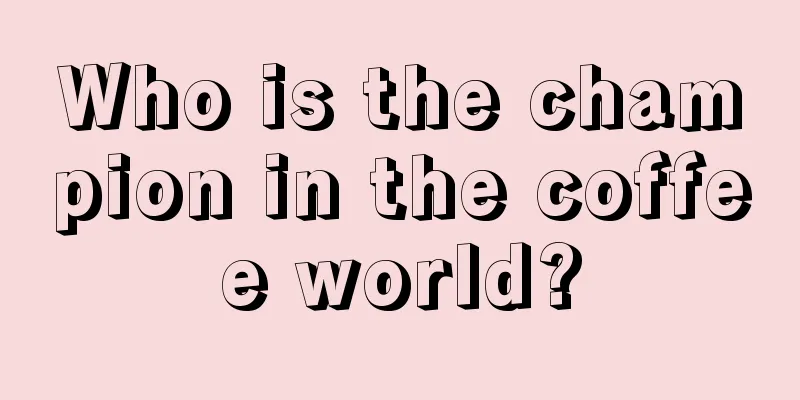The discovery of coffee beans: mankind's first encounter with aromatic black liquor

Humankind’s first encounter with aromatic black liquorCoffee beans, this tiny seed, carries the human pursuit of deliciousness and excitement. It is a magical plant that originated from the Ethiopian Plateau in Africa. After thousands of years of spread and evolution, it has formed a unique and diverse coffee culture around the world. However, the first encounter between humans and the fragrant black liquor is an accidental and beautiful story. Originated from legendAccording to legend, coffee beans were discovered by an Ethiopian shepherd named Kaldi Sheikh Ali Darghilebi in the 9th century. He noticed that his goats became unusually active and unable to sleep at night after eating certain red berries. Curious, he tasted the berries and felt more energetic and cheerful than ever before. With this discovery, Kaldi began to bring these miracle berries back home, where he tasted them with his family and used them in cooking. Word of the miraculous effect soon spread, sparking the interest and curiosity of people around him. From then on, coffee beans began to spread across the Ethiopian plateau. From Mystery to GlobalizationAs time went on, coffee beans were discovered to have more potential. People began to roast, grind and brew them into a fragrant black liquor. Not only did it bring pleasure and energy, it also became a vehicle for social, cultural and artistic exchange. In the 13th century, coffee beans were introduced to the Middle East by Arab merchants and quickly became popular there. Then, in the 16th century, they were further spread to European countries through Turkey and were loved by nobles and intellectuals. It was the exploration and colonization of Africa, Asia, and America during the European colonial period that further spread coffee beans around the world. The climate, soil, and cultivation methods of different regions have gradually led to the formation of a variety of coffee beans and flavors. The evolution of coffee cultureAs coffee beans spread around the world, each region has gradually formed a unique and rich coffee culture. From the strong espresso of Italy to the elegant and delicate latte of France, to the rich and mellow Americano of the United States, each flavor represents a different region and cultural background. In addition to different tastes, people also have their own unique and deeply rooted habits when drinking coffee. For example, in the eyes of Italians, drinking a cup of espresso is an indispensable ritual to start a new day; while in Turkey, there is a saying of "poetry in a cup", believing that the future can be predicted after the last sip. ConclusionFrom the shepherd who accidentally discovered the small seed on the African plateau thousands of years ago to the fact that it has become one of the most popular drinks in the world, the discovery and spread of coffee beans has not only changed people's pursuit of deliciousness and excitement, but also enriched the culture and exchanges of various regions. Whether it is enjoying the pleasure of a cup of fragrant coffee when waking up in the morning, or feeling the warmth and closeness when sharing a cup of latte with friends in the afternoon, coffee has become an indispensable part of our lives. |
<<: Why are the ground coffee beans concentrated?
>>: Global coffee bean battle: Which country has the best coffee?
Recommend
Do you know which of the top ten coffee bean producing areas in the world?
Top 10 coffee bean producing areas in the world C...
The origin of coffee, explore the world's most famous coffee producing area
Abstract: The Origin of Coffee explores the world...
Coffee: A must-have for refreshing your mind
The origin of coffee Coffee is a plant that origi...
Coffee, pros and cons, do you really understand?
Coffee is a popular drink that has benefits such ...
Stardew Valley Coffee: The magic of time meets deliciousness
Stardew Valley Coffee: The magic of time meets de...
Jieshou Coffee: A regular brand you can trust
Jieshou Coffee: A regular brand you can trust As ...
Which Starbucks coffee beans are the best?
Explore Starbucks coffee bean varieties and their...
The secret of making American coffee will instantly upgrade your coffee!
This article introduces the secrets of making the...
Does coffee make you fat? The truth revealed
Coffee itself will not cause weight gain, because...
What is the most famous coffee bean in Yunnan?
Explore the mysterious charm of Yunnan coffee bea...
A lighter roasting method for coffee beans
Light roasting: new flavors for coffee beans Coff...
How many of the star coffee bean varieties do you know?
Coffee is one of the most popular drinks in the w...
A comprehensive analysis of the pros and cons of drinking instant coffee, understanding its impact on health and how to choose it correctly
A comprehensive analysis of the pros and cons of ...
Can people with insomnia drink coffee?
Can people with insomnia drink coffee? Insomnia i...
The origin and growth process of coffee beans
The origin of coffee beans Coffee beans are seeds...









